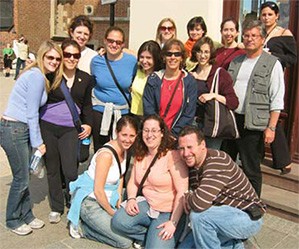
“You’re going to Poland? Why?”
This question was posed to nearly all of us who participated in the University of Michigan Sol Drachler Program in Jewish Communal Leadership trip to Poland this past spring. The question was sometimes asked jokingly (“If you want to go to Europe, isn’t Paris prettier this time of year? Have you considered Venice?”), but sometimes with an aching seriousness. My own grandmother was one of the more serious inquisitors. Born in Czechoslovakia in 1918, as a young woman my grandmother fled that part of the world and found safety in America—but her parents and five of her eight siblings perished in the Holocaust, and most of the surviving family members suffered in Polish concentration camps, including Auschwitz, until liberation. For my grandmother, Poland was a place of darkness and death, and her question was valid: Why? Why would we want to go there?
We cannot overlook or downplay the tragic reality of World War II and the Holocaust, and the sites of the mass murders, so many of which took place on Polish soil. The mantra “never again” is repeated over and over in Holocaust education, and therein lies the first answer to the question of why we went to Poland: to see the history. To encounter the reality. To never forget.
However, “to remember” is only a partial answer to the question of why we went to Poland. The other side of the answer is that we need not only to remember the past, but also to turn our eyes to the present and our hopes to the future. In Poland, while the shadows of the past still loom large, the vibrant energy of the country’s contemporary Jewish community helps to illuminate the fact that communities can rebuild, and the strength and optimism of committed individuals working together for peace and progress can truly begin to change the way we see the world.
So much of what we learn in our University of Michigan classrooms about the principles of community organizing, interpersonal practice, privilege, oppression, diversity, and social justice was brought to vivid life as we learned about the Polish experience. Interacting with a place where genocide occurred serves as a reminder to always fight against such atrocities.
In one day, our experience ran the gamut from the horrors of the past, to the righteous people who brought hope even in the darkest of times, to the new generation of young Polish Jews enthusiastically rebuilding their community. We felt the ghosts at AuschwitzBirkenau and Majdanek, but we also felt the infectious spirit of the modern Jewish leadership. We toured historic synagogues in the former Jewish quarter of Krakow, visited Schindler’s factory, and met with Jewish community leaders in Warsaw. We began to see Poland not simply as the dark “old country,” but a country still rich with heritage. We know now that we cannot simply cling to the memories of the past; wherever we are, whatever communities we work with, we need to support one another in building a brighter future.
This incredible trip was made possible by the Ben Teitel Charitable Trust and the generous support of Bob and Carol Deutsch, Joan Fisch, Barbara and Victor Klein, Marty and Ben Rosenthal, and Jane and Larry Sherman, as well as the University of Michigan, through the International Institute Experiential Learning Fund, the Drachler Alumni Fund, and the Drachler Program itself. We thank all of these supporters for giving us this invaluable experience.
We came home exhausted and enriched, introspective and inspired . . . and that’s exactly why we went to Poland.
If you would like to know more about our trip, please contact the Drachler Program (734-764-5392 or drachler@ umich.edu).
—Beth Kander is an MSW student in the Sol Drachler Program in Jewish Communal Leadership.